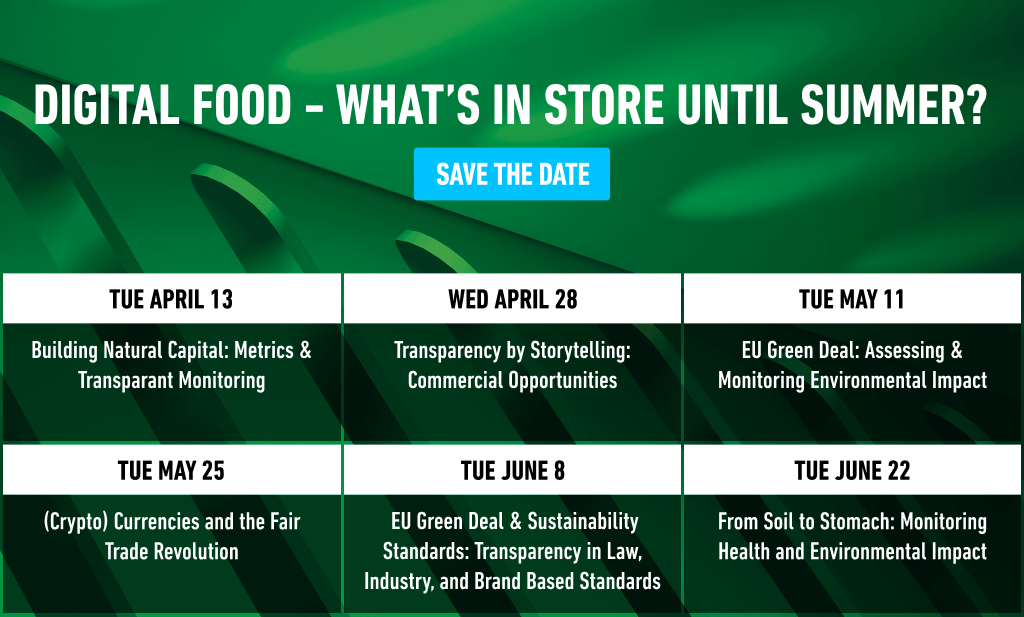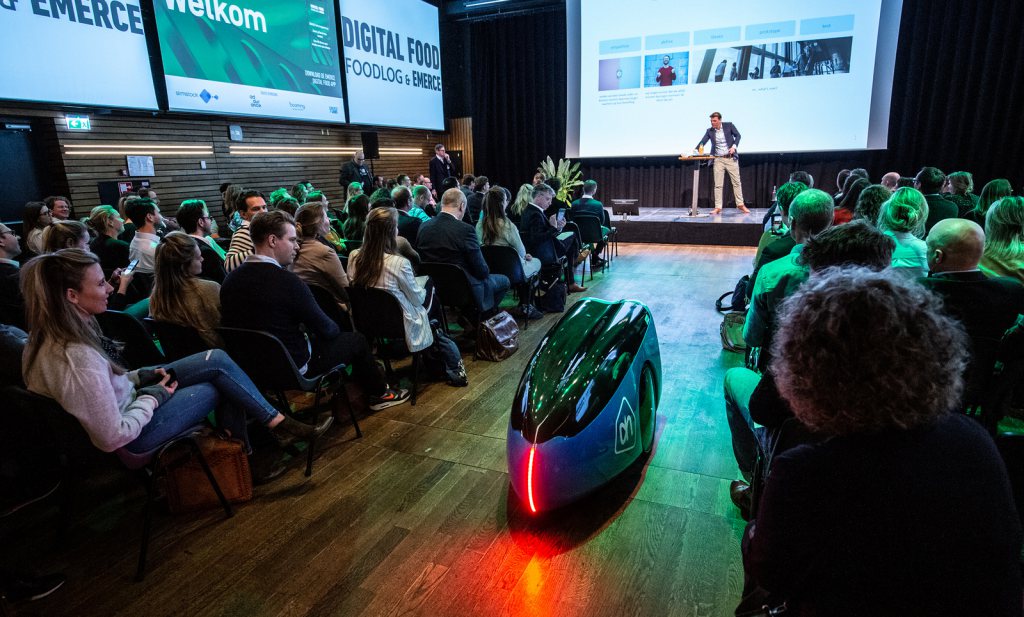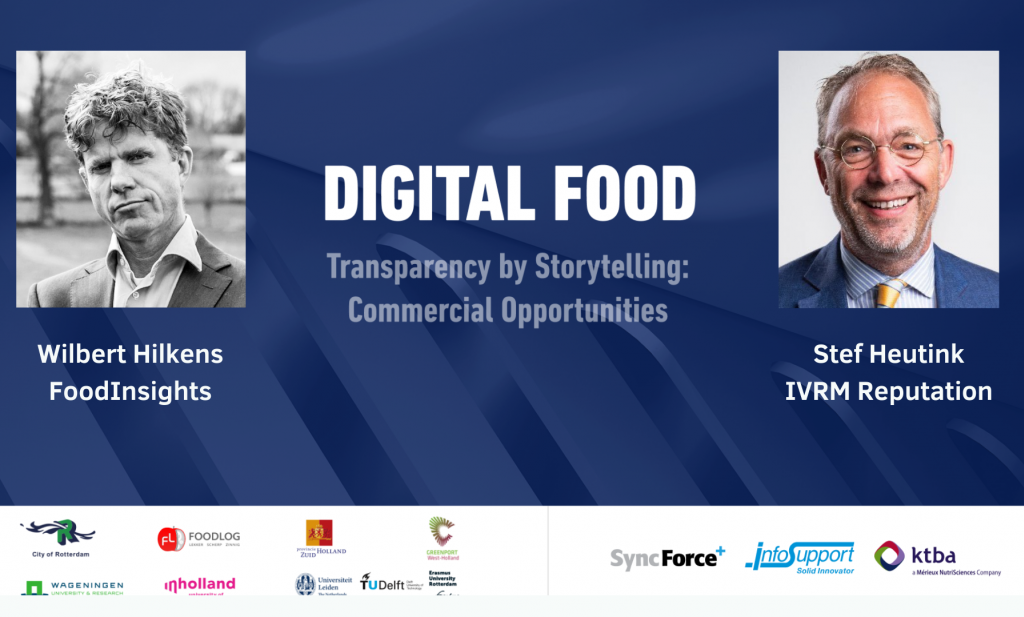Join us on Wednesday, April 28, from 1:30 PM till 2:15 PM (CET) + 45 more minutes of informality (if you care to stay on) for the eighth chat in the Digital Food series. (Due to Dutch King's Day on Tuesday April 27, we move this chat one day to Wednesday April 28.)
Thanks to food digitisation, consumers, retailers, and food processors can make more informed choices. Up till now the complex structure of the food system was beyond consumers' grasp of the full life cycle leading the products they buy. As cycle's data become available, new opportunities arise. Tell the whole and true story is feasible now. A whole new story telling service assuring the product's quality is rapidly turning into a full blown assurance service and new marketing tool.
Wilbert Hilkens, CEO and founder of FoodInsights, and Stef Heutink from IVRM Reputation will show the audience how presenting stories can provide new commercial opportunities.
Data driven storytelling bridges the sterility gap between plain hard data and warm blooded human trust. Consumers want to know about the health benefits of the products, where they came from, and about their environmental impact. Product data can be used to tell stories, using images and text. These stories are an extra layer of information on top of labels.
Retailers, farmers, food brands, and processors are on the brink of adding a new layer of distinction to their products. At the same time, the new technologies will help them build trust through transparency.

Wilbert Hilkens
Wilbert Hilkens, FoodInsights
Food Insights was founded by Wilbert Hilkens in 2017. “The passion and dedication that you put into your products is a story worth telling.” This is what Hilkens believes in and strives for. Food Insights connects food companies and people with innovative and transparent supply chain solutions. In this way he improves consumer trust.

Stef Heutink
Stef Heutink, IVRM Reputation
Originally, Stef Heutink is a digital strategist. He has been involved in brand strategy and its influence on reputation for about 15 years now. Since 2018 Heutink has been creative director at IVRM Reputation. His specialism focuses on unravelling the core of an organisation or brand and developing communication, brand, and marketing strategies from there.
What’s in Store until Summer?

Wilbert Hilkens, CEO and founder of FoodInsights, and Stef Heutink from IVRM Reputation will show the audience how presenting stories can provide new commercial opportunities.
Data driven storytelling bridges the sterility gap between plain hard data and warm blooded human trust. Consumers want to know about the health benefits of the products, where they came from, and about their environmental impact. Product data can be used to tell stories, using images and text. These stories are an extra layer of information on top of labels.
Retailers, farmers, food brands, and processors are on the brink of adding a new layer of distinction to their products. At the same time, the new technologies will help them build trust through transparency.

Wilbert Hilkens, FoodInsights
Food Insights was founded by Wilbert Hilkens in 2017. “The passion and dedication that you put into your products is a story worth telling.” This is what Hilkens believes in and strives for. Food Insights connects food companies and people with innovative and transparent supply chain solutions. In this way he improves consumer trust.

Stef Heutink, IVRM Reputation
Originally, Stef Heutink is a digital strategist. He has been involved in brand strategy and its influence on reputation for about 15 years now. Since 2018 Heutink has been creative director at IVRM Reputation. His specialism focuses on unravelling the core of an organisation or brand and developing communication, brand, and marketing strategies from there.

PREVIOUS CHATS IN THIS SERIES
1. Digitisation will disrupt the food system as we know it
In the opening chat of the series, moderator Tiffany Tsui chats with panelists Paul Buisman (Moba, egg packing machines), Kristian Möller (GlobalG.A.P.), Hans de Gier (SyncForce, data integration), and Dick Veerman (Foodlog) to discuss the challenges ahead in the world of digital food.
2. Bye Manpower, Hello Machines and Value
3. The True Code - a free global digital Passport for every Farmer and Facility
Chat 3: in the near future, data will travel with products. Retailers and brands need fast, cheap, and reliable data. There are several platforms (blockchains, data lakes, ERP systems) that already contain supplier and product related-data. These platforms, however, are not interconnected. Data exchange is limited and complicated. Interconnectivity and the easy exchange of data cannot do without a reliable, yet simple identification of every individual company that has a role in the supply chain. This can be done by using a unique electronic passport connected to every individual facility that is an actor in the chain.
4. Blooming Africa - the transfer of practical know how, organising farmers, the AfCFTA free trade area and creating value with transparency
Tiffany Tsui discusses - during the fourth chat - with hands on expert Dutch strawberry grower and advisor Jan Robben, TRUE Code-developer Marjan de Bock-Smit, Victoria Madedor (African Farmers Stories), and Dr Ikechi Agbugba (Rivers State University, Nigeria) how recent border closures on the one hand and new trade opportunities on the other impact agriculture in Africa.
At 1:08:00 min. they were spontaneously joined by Memory Nyakwima Chakwita from Zimbabwe who showed the potential strawberry fields in which she would like to apply all that was discussed. It was a special moment in the informal part of the discussion, showing the potential of this way of connecting people, expertise and ideas.
5. How to unlock Africa’s agricultural potential?
In the fifth chat of the Digital Food series, Tiffany Tsui asked her panel of African experts about challenges to organize trust, capital and infrastructure for African smallholder entrepreneurs. Victoria Madedor (African Farmers Stories), Babatunde Olarewaju (Futux Agri Consult, Lagos, Nigeria), and Dr Ikechi Agbugba (Rivers State University, Nigeria) discussed the overcoming challenges to trade and export of crops. Marjan de Bock-Smit (founder ImpactBuying, former CEO SIM Supply) responds.
6. Carbon Credits: Discovering the Self-Financing Potential of African Farmers
Carbon emissions are a growing concern for big companies. The digitisation of food will make their efforts - or lack of them - transparant to the consumer. Investors like BlackRock prefer the big brands to take responsibility. That's why carbon credits are coming of age in the trade of doing ethical business. Africa and its farmers will probably profit the most from carbon credits as can help them build on their own capital. Are carbon credits indeed the holy grail?
The first Digital Food conference in it's pre-covid physical guise in Amsterdam, 2019.

1. Digitisation will disrupt the food system as we know it
In the opening chat of the series, moderator Tiffany Tsui chats with panelists Paul Buisman (Moba, egg packing machines), Kristian Möller (GlobalG.A.P.), Hans de Gier (SyncForce, data integration), and Dick Veerman (Foodlog) to discuss the challenges ahead in the world of digital food.
2. Bye Manpower, Hello Machines and Value
In the absence of a global authority that is aware of the powers unleashed by the digitisation of food, what 'no-body' can guard the interests of the global community?Hans de Gier (SyncForce) explains - during the second chat - the Consumer Goods Forum's Data Ports project. The project's goal is to make the myriad of product standards interoperable by a common basic taxonomy and connecting simple identifiers. The good news: it is fully feasible, as Hans explains in great technical detail.
3. The True Code - a free global digital Passport for every Farmer and Facility
Chat 3: in the near future, data will travel with products. Retailers and brands need fast, cheap, and reliable data. There are several platforms (blockchains, data lakes, ERP systems) that already contain supplier and product related-data. These platforms, however, are not interconnected. Data exchange is limited and complicated. Interconnectivity and the easy exchange of data cannot do without a reliable, yet simple identification of every individual company that has a role in the supply chain. This can be done by using a unique electronic passport connected to every individual facility that is an actor in the chain.
4. Blooming Africa - the transfer of practical know how, organising farmers, the AfCFTA free trade area and creating value with transparency
Tiffany Tsui discusses - during the fourth chat - with hands on expert Dutch strawberry grower and advisor Jan Robben, TRUE Code-developer Marjan de Bock-Smit, Victoria Madedor (African Farmers Stories), and Dr Ikechi Agbugba (Rivers State University, Nigeria) how recent border closures on the one hand and new trade opportunities on the other impact agriculture in Africa.
At 1:08:00 min. they were spontaneously joined by Memory Nyakwima Chakwita from Zimbabwe who showed the potential strawberry fields in which she would like to apply all that was discussed. It was a special moment in the informal part of the discussion, showing the potential of this way of connecting people, expertise and ideas.
5. How to unlock Africa’s agricultural potential?
In the fifth chat of the Digital Food series, Tiffany Tsui asked her panel of African experts about challenges to organize trust, capital and infrastructure for African smallholder entrepreneurs. Victoria Madedor (African Farmers Stories), Babatunde Olarewaju (Futux Agri Consult, Lagos, Nigeria), and Dr Ikechi Agbugba (Rivers State University, Nigeria) discussed the overcoming challenges to trade and export of crops. Marjan de Bock-Smit (founder ImpactBuying, former CEO SIM Supply) responds.
6. Carbon Credits: Discovering the Self-Financing Potential of African Farmers
Carbon emissions are a growing concern for big companies. The digitisation of food will make their efforts - or lack of them - transparant to the consumer. Investors like BlackRock prefer the big brands to take responsibility. That's why carbon credits are coming of age in the trade of doing ethical business. Africa and its farmers will probably profit the most from carbon credits as can help them build on their own capital. Are carbon credits indeed the holy grail?




